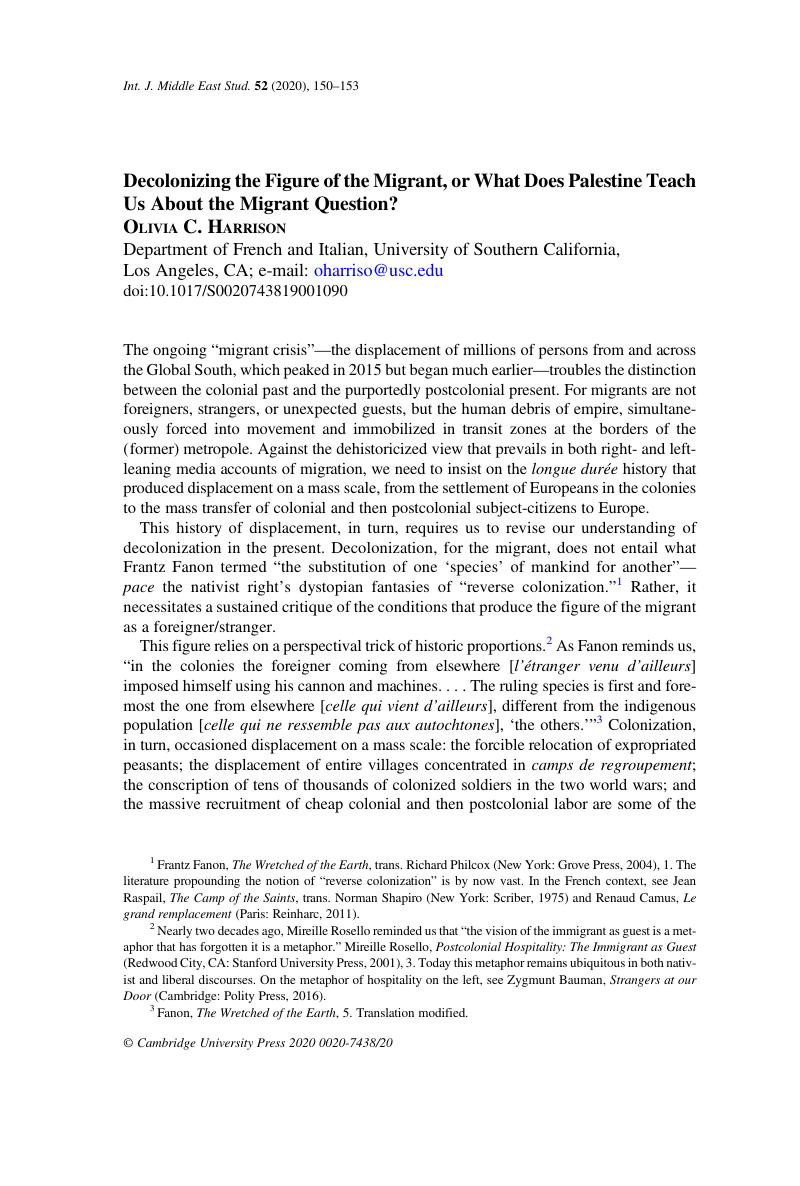Article contents
Decolonizing the Figure of the Migrant, or What Does Palestine Teach Us About the Migrant Question?
Published online by Cambridge University Press: 04 March 2020
Abstract

- Type
- Roundtable
- Information
- Copyright
- Copyright © Cambridge University Press 2020
References
1 Fanon, Frantz, The Wretched of the Earth, trans. Philcox, Richard (New York: Grove Press, 2004), 1Google Scholar. The literature propounding the notion of “reverse colonization” is by now vast. In the French context, see Raspail, Jean, The Camp of the Saints, trans. Shapiro, Norman (New York: Scriber, 1975)Google Scholar and Camus, Renaud, Le grand remplacement (Paris: Reinharc, 2011)Google Scholar.
2 Nearly two decades ago, Mireille Rosello reminded us that “the vision of the immigrant as guest is a metaphor that has forgotten it is a metaphor.” Rosello, Mireille, Postcolonial Hospitality: The Immigrant as Guest (Redwood City, CA: Stanford University Press, 2001), 3Google Scholar. Today this metaphor remains ubiquitous in both nativist and liberal discourses. On the metaphor of hospitality on the left, see Bauman, Zygmunt, Strangers at our Door (Cambridge: Polity Press, 2016)Google Scholar.
3 Fanon, The Wretched of the Earth, 5. Translation modified.
4 Patrick Chamoiseau and Achille Mbembe dial back to 1492 to include trans-Atlantic slavery in the longue durée history of colonial displacement erased in nativist discourses about the “hordes of migrants” at our door. Mbembe, Achille, Politiques de l'inimitié (Paris: La Découverte, 2016), 85–86Google Scholar. My translation. Patrick Chamoiseau, Frères migrants (Paris: Seuil, 2017), 23.
5 Genet, Jean, Prisoner of Love, trans. Bray, Barbara (New York: New York Review of Books, 2003), 15Google Scholar. My understanding of nativist claims to indigeneity is indebted to the work of Mahmood Mamdani, particularly his analysis of “the [politicization] of indigeneity” in postcolonial Africa. Mamdani, Mahmood, When Victims Become Killers: Colonialism, Nativism, and the Genocide in Rwanda (Princeton, NJ: Princeton University Press), 14Google Scholar. I discuss the colonizer's fantasy of becoming “native” in the colony in “Portrait of an Arab Jew,” in Transcolonial Maghreb: Imagining Palestine in the Era of Decolonization, by Olivia C. Harrison (Redwood City, CA: Stanford University Press, 2016), 81–100.
6 Fanon, The Wretched of the Earth, 39. Translation modified.
7 Said, Edward, The Question of Palestine (New York: Vintage Press, 1992), xliGoogle Scholar.
8 I have not been able to find a source that separately lists the number of Palestinians (refugees or occupied Palestinians) displaced since 2011. UNWRA, which keeps track of Palestinian refugees in the Middle East, has estimates for those displaced within and outside of Syria. “Syria Crisis,” United Nations Relief and Works Agency for Palestinians in the Near East, accessed 7 February 2019, https://www.unrwa.org/syria-crisis. On Palestinian refugees leaving Lebanon for Europe, see “Palestinians Desperate to Flee Lebanon Refugee Camp,” Al Jazeera, 5 April 2015, https://www.aljazeera.com/news/2015/03/palestinians-desperate-flee-lebanon-refugee-camp-150330080534973.html.
9 Said, Edward, Culture and Imperialism (New York: Knopf, 1993), 332Google Scholar.
10 Laâbi, Abdellatif, “Réalités et dilemmes de la culture nationale (II),” Souffles 6 (1967): 29Google Scholar.
11 Human Flow, dir. Ai Weiwei (Participant Media, 2017). Nathacha Appanah, Tropique de la violence (Paris: Gallimard, 2016).
12 Yacine, Kateb, “Mohamed prends ta valise,” in Boucherie de l'espérance: oeuvres théâtrales, ed. Chergui, Zebeida (Paris: Seuil, 1999), 205–370Google Scholar; Jelloun, Tahar Ben, La réclusion solitaire (Paris: Denoël, 1976)Google Scholar. Boukhedenna, Sakinna, Journal, Nationalité: immigré(e) (Paris: La Découverte, 1987)Google Scholar.
13 For a fuller version of this argument, see Olivia C. Harrison, Transcolonial Maghreb, 41–59.
14 Fanon, The Wretched of the Earth, 1.
15 Genet, Prisoner of Love, 15.
16 Kanafani, Ghassan, Men in the Sun and Other Palestinian Stories, trans. Kilpatrick, Hilary. (Boulder, CO: Lynne Rienner Publishers, 1999)Google Scholar.
17 Didi-Huberman, Georges and Giannari, Niki, Passer, quoiqu'il en coûte (Paris: Minuit, 2017), 31Google Scholar. Original italics. My translation.
- 2
- Cited by




